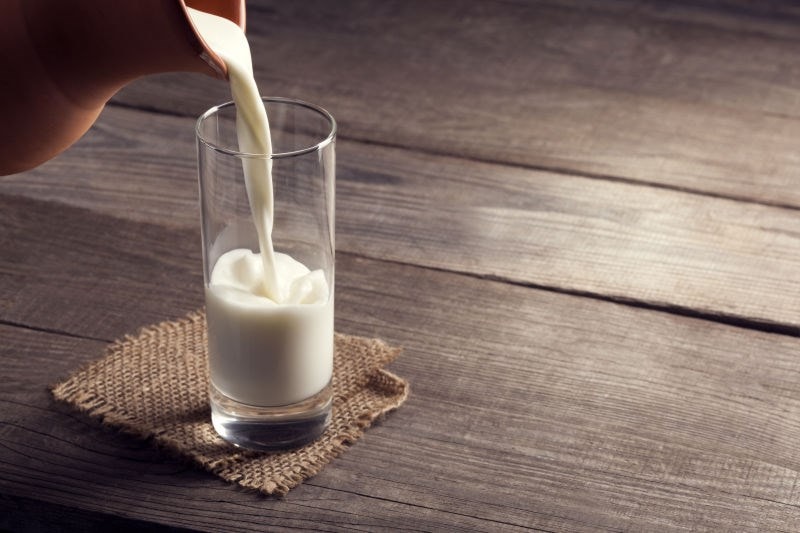Can milk cause constipation?
Milk and other dairy foods are thought to be a trigger for constipation in some. Let's explore this further, identify the potential causes for this, and look at possible alternatives to these foods.
- Why can dairy cause constipation?
- Constipation and lactose intolerance
- Dairy products that may help constipation
- Milk alternatives
- Dairy-free probiotics

Why does dairy cause constipation?
The milk that most of us buy is deemed to be a processed food due to the processes it goes through before it reaches the shelves. It may contain both antibiotics and hormones from the cows it originates from, and is almost always pasteurised in order to kill off milk-borne bacteria. However, the pasteurisation process also removes valuable enzymes that help us to digest the milk, as well as other important vitamins and minerals1. Additionally, in contrast to traditional farming methods, intensive farming techniques have led to cows being fed grain rather than grass. This has the potential to cause further digestive problems and act as a trigger for constipation, particularly in those sensitive to grains.
Dairy is considered by many health practitioners to be mucus-forming in the body, and for this reason it can be helpful to avoid dairy products if you are suffering from a cold or hay fever and trying to relieve a runny nose2. In Traditional Chinese Medicine, milk and other dairy products are labelled as damp-inducing foods (foods that can make our internal systems sluggish), which may also go some way to explaining why they could cause constipation and digestive problems. According to Traditional Chinese Medicine, the Spleen meridian (the digestive system) does not like cold or so-called damp foods, with ice cream being a strong example.
Constipation and lactose intolerance
If you believe that dairy foods act as a trigger for your constipation, it does not necessarily mean that you are lactose intolerant. In fact, it is more typical for those who are lactose intolerant to experience diarrhoea3. It may also cause bloating and abdominal discomfort as a lack of the enzyme lactase, which we need in order to break down milk, causes the dairy in our system to ferment and release excess gas. Taking a probiotic supplement can be really helpful for those with a lactose intolerance, as the beneficial bacteria exert an enzyme-like activity, helping to breakdown the lactose (sugar) in the milk4.
Dairy products that may reduce constipation
There are certain forms of dairy foods that may actually be helpful in relieving digestive problems. Raw milk is considered by many natural health practitioners to be more easily digested than the more widely available pasteurised varieties, and may be helpful in relieving constipation and other digestive problems5. Raw milk is something of a controversial subject and it is important to source as much information as possible to help determine if it is suitable for you. If it is something you would like to try, it is recommended that you get this from a reputable supplier.
Live natural yoghurt contains live cultures which may possess a probiotic benefit in helping to boost levels of healthy gut bacteria, working to improve digestion and keeping things moving. Another more unusual type of dairy food called kefir may also be beneficial to those experiencing constipation and abdominal discomfort. Kefir is a type of fermented milk containing live cultures, and is used in many Eastern and Northern European countries as a health food. Kefir is becoming more popular here in the UK too, as its potential health benefits in the gut are recognised.
Alternatives to dairy
It may be helpful to try avoiding dairy products to reduce constipation, but as they are a useful source of protein and calcium, as well as other minerals, it is important to take care to replace these nutrients. There are many other delicious foods we can include in our diet to ensure we maintain an adequate calcium intake including sardines, green leafy vegetables (pak choi, broccoli, swiss chard, cabbage, kale, spring greens etc), sweet potatoes, sesame and sunflower seeds, tahini, figs, blackstrap molasses and almonds. If you are concerned that removing milk and dairy foods from your diet may impact upon your health, certainly seek advice from a Nutritional Therapist or Naturopath.
There are a number of great alternatives to cow's milk. Some popular choices are coconut milk, unsweetened almond milk, oat milk and rice milk. Coconut milk, which differs from the thicker, more concentrated type you would add to curries, is also a source of medium chain triglycerides, providing the body with an easily accessible source of energy. Almond milk is also rich in calcium, making a lovely alternative to dairy.
It is worth bearing in mind that we are all individuals. Some people may be able to tolerate milk and dairy products very well, and for others it may cause constipation and digestive discomfort. A food diary, or elimination diet may be helpful in determining whether this food group is a potential problem for you, and by slowly reintroducing them you may find some products such as butter and ghee are better tolerated and do not cause constipation. In addition to an elimination diet, there are many other natural remedies for constipation that be looked into further.
Dairy-free probiotics
Some strains of probiotic are grown on a food substrate that contains dairy. For people with an allergy to dairy, or for those following a strictly vegan diet, they may need to source dairy-free probiotics. Many strains of probiotic bacteria, including the strain Bifidobacterium lactis BB-12, which is a well-researched strain for constipation6, grow well on a dairy-free substrate and would therefore make a great option for those needing to avoid even possible traces of dairy. B. lactis BB-12® probiotic strain has been trialled in specific groups of individuals, including the elderly and pregnant women, who are more vulnerable to constipation. It has also been trialled in those with regular bowel movements showing a normalising effect on defaecation rate7.
To find out more about constipation you may also like to read:
Constipation and nausea: are they related?
References
- Macdonald LE, Brett J, Kelton D, Majowicz SE, Snedeker K, Sargeant JM. A systematic review and meta-analysis of the effects of pasteurization on milk vitamins, and evidence for raw milk consumption and other health-related outcomes. J Food Prot. 2011 Nov;74(11):1814-32. doi: 10.4315/0362-028X.JFP-10-269. PMID: 22054181.
- Frosh A, Cruz C, Wellsted D, Stephens J. Effect of a dairy diet on nasopharyngeal mucus secretion. Laryngoscope. 2019 Jan;129(1):13-17. doi: 10.1002/lary.27287. Epub 2018 Sep 4. PMID: 30178886.
- Deng Y, Misselwitz B, Dai N, Fox M. Lactose Intolerance in Adults: Biological Mechanism and Dietary Management. Nutrients. 2015 Sep 18;7(9):8020-35. doi: 10.3390/nu7095380. PMID: 26393648; PMCID: PMC4586575.
- Oliveira LS, Wendt GW, Crestani APJ, Casaril KBPB. The use of probiotics and prebiotics can enable the ingestion of dairy products by lactose intolerant individuals. Clin Nutr. 2022 Dec;41(12):2644-2650. doi: 10.1016/j.clnu.2022.10.003. Epub 2022 Oct 12. PMID: 36308983.
- Mohammadi Bourkheili A, Mehrabani S, Esmaeili Dooki M, Haji Ahmadi M, Moslemi L. Effect of Cow's-milk-free diet on chronic constipation in children; A randomized clinical trial. Caspian J Intern Med. 2021 Winter;12(1):91-96. doi: 10.22088/cjim.12.1.91. PMID: 33680404; PMCID: PMC7919185.
- Eskesen D, Jespersen L, Michelsen B, Whorwell PJ, Müller-Lissner S, Morberg CM. Effect of the probiotic strain Bifidobacterium animalis subsp. lactis, BB-12®, on defecation frequency in healthy subjects with low defecation frequency and abdominal discomfort: A randomised, double-blind, placebo-controlled, parallel-group trial. Br J Nutr. 2015;114(10):1638-1646. doi:10.1017/S0007114515003347
- Jungersen M, Wind A, Johansen E, Christensen JE, Stuer-Lauridsen B, Eskesen D. The Science behind the Probiotic Strain Bifidobacterium animalis subsp. lactis BB-12(®). Microorganisms. 2014 Mar 28;2(2):92-110. doi: 10.3390/microorganisms2020092. PMID: 27682233; PMCID: PMC5029483.

